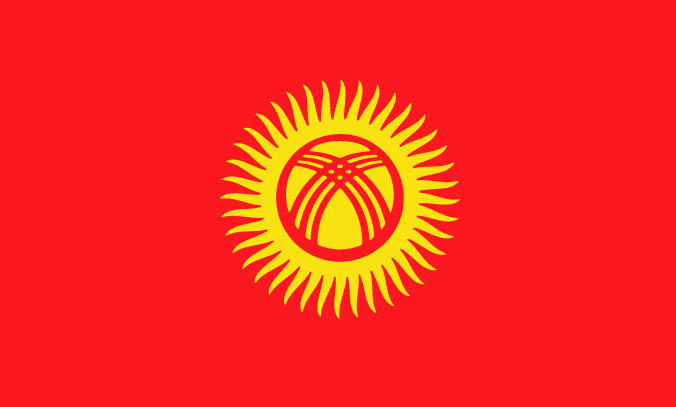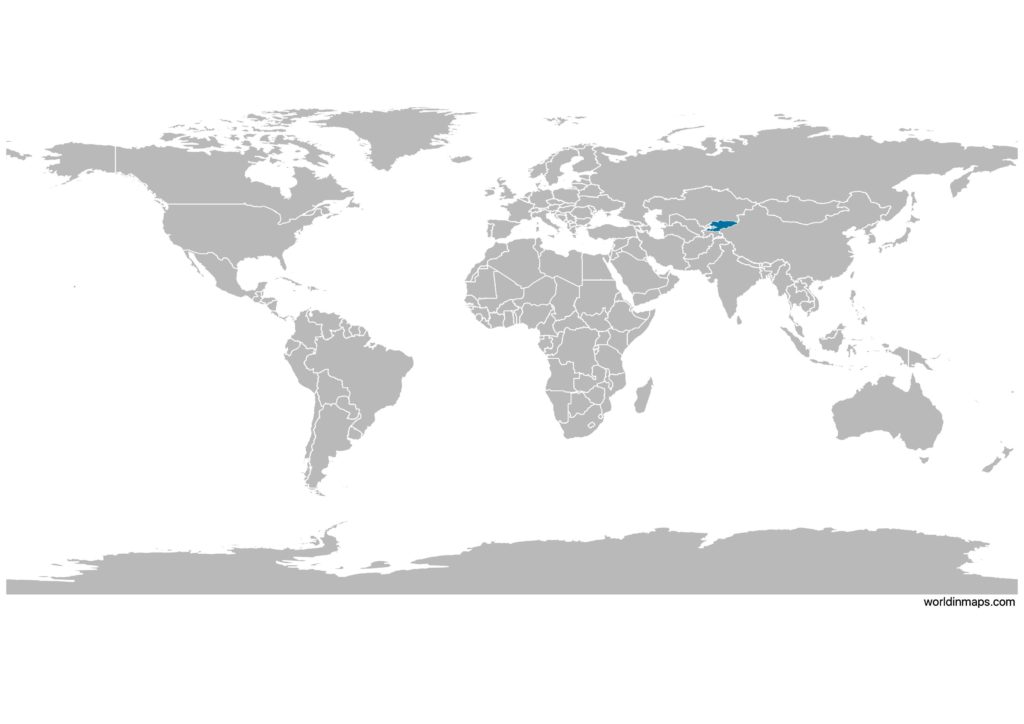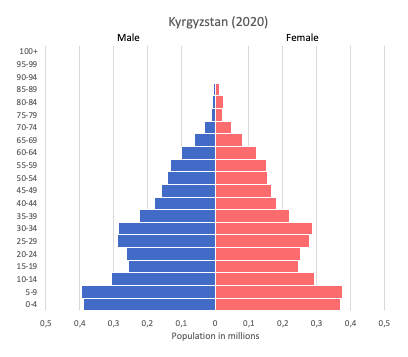Kyrgyzstan

| Government | |
| Name | Kyrgyz Republic |
| Kyrgyz | Кыргыз Республикасы Qırğız Respubliqası |
| Russian | Кыргызская Республика Kyrgyzskaya Respublika |
| Government type | Parliamentary republic |
| Capital | Bishkek (750,327) |
| Currency | Som (KGS) |
| Organization | |
| Member State | Commonwealth of Independent States (CIS) |
| People | |
| Population (2020) | 6,524,191 (110th) |
| Density of population | 27.4 P/km2 (176th) |
| Nationality | Kyrgyzstani |
| Official languages | |
| Kyrgyz | |
| Russian | |
| Ethnic groups (2019) | |
| Kyrgyz | 73.5% |
| Uzbek | 14.7% |
| Russian | 5.5% |
| Dungan | 1.1% |
| other | 5.2% |
| Religions (2017) | |
| Muslim (majority Sunni) | 90% |
| Christian (Russian Orthodox 3%) | 7% |
| other | 3% |
| Life expectancy (2020) | |
| Male | 67.7 years |
| Female | 76.2 years |
| Total population | 71.8 years (159th) |
| Homicides | |
| Total (2018) | 2.2 per 100,000 people (104th) |
| Geography | |
| Land area | 191,801 km2 |
| water area | 8,150 km2 |
| total area | 199,951 km2 (88th) |
| Mean elevation | 2,988 m |
| Lowest point | |
| Kara-Daryya (Karadar’ya) | 132 m |
| Highest point | |
| Jengish Chokusu (Pik Pobedy) | 7,439 m |
| Land use (2011) | |
| Agricultural land | 55.4% |
| Arable land | 6.7% |
| Permanent crops | 0.4% |
| Permanent pasture | 48.3% |
| Forest | 5.1% |
| Other | 39.5% |
| Urbanization | |
| Urban population (2020) | 36.9% |
| Rate of urbanization | 2.03% annual rate of change (2015 – 2020) |
| Economy | |
| Labor force (2017) | 2.841 million (107th) |
| Labor force by occupation (2005) | |
| Agriculture | 48% |
| Industry | 12.5% |
| Services | 39.5% |
| Unemployment rate (2017) | 7.1% (109th) |
| GDP (PPP) (estimate 2019) | |
| Total | $25.915 billion (136th) |
| Per capita | $4,056 (143rd) |
| GDP (nominal) (estimate 2019) | |
| Total | $8.261 billion (142nd) |
| Per capita | $1,293 (154th) |
| GDP by sector (estimate 2017) | |
| Agriculture | 14.6% |
| Industry | 31.2% |
| Services | 54.2% |
| Exports (2017) | $1.84 billion (144th) |
| Exports partners (2017) | |
| Switzerland | 59.1% |
| Uzbekistan | 9.4% |
| Kazakhstan | 5.1% |
| Russia | 4.9% |
| UK | 4% |
| Imports (2017) | $4.187 billion (137th) |
| Imports partners (2017) | |
| China | 32.6% |
| Russia | 24.8% |
| Kazakhstan | 16.4% |
| Turkey | 4.8% |
| US | 4.2% |
Kyrgyzstan on the world map

Kyrgyzstan is located on the Asian continent and more specifically in the region of Central Asia.
Kyrgyzstan top 10 largest cities
- Bishkek (750,327)
- Osh (208,520)
- Jalal-Abad (70,401)
- Karakol (64,322)
- Tokmok (59,409)
- Kara-Balta (47,159)
- Uzgen (41,497)
- Balykchy (41,342)
- Naryn (40,050)
- Talas (32,638)
Demography
Population pyramid

Age structure data
Estimate for 2020:
- 0-14 years: 30.39% (male 930,455/female 882,137)
- 15-24 years: 15.7% (male 475,915/female 460,604)
- 25-54 years: 40.02% (male 1,172,719/female 1,214,624)
- 55-64 years: 8.09% (male 210,994/female 271,480)
- 65 years and over: 5.8% (male 132,134/female 213,835)
Remark: the age structure of a population affects a nation’s key socioeconomic issues. Countries with young populations (high percentage under age 15) need to invest more in schools, while countries with older populations (high percentage ages 65 and over) need to invest more in the health sector. The age structure can also be used to help predict potential political issues. For example, the rapid growth of a young adult population unable to find employment can lead to unrest.
Population from 1950 to 2020
Source: United Nations, Department of Economic and Social Affairs, Population Division (2019). World Population Prospects 2019, Online Edition. Rev. 1.
Evolution of the life expectancy from 1960 to 2018
Source: World Development Indicators, The World Bank
Economy
Agriculture:
cotton, potatoes, vegetables, grapes, fruits and berries, sheep, goats, cattle, wool
Industries:
small machinery, textiles, food processing, cement, shoes, lumber, refrigerators, furniture, electric motors, gold, rare earth metals
Exports – commodities:
gold, cotton, wool, garments, meat, mercury, uranium, electricity, machinery, shoes
Imports – commodities:
oil and gas, machinery and equipment, chemicals, foodstuffs
Time zone and current time in Kyrgyzstan
Go to our interactive map to get the current time in Kyrgyzstan
Historical region
- Kyrgyzstan was known by European from the Middle age to the 20th century as making part of Tartary.